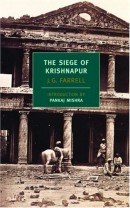 In the wake of the National Book Awards announcement yesterday, Sam Anderson says, “I still believe that Freedom is a great novel; I still want to eat some of its sentences with tiny little corn holders.” But he doesn’t mind that it was left off the list of nominees.
In the wake of the National Book Awards announcement yesterday, Sam Anderson says, “I still believe that Freedom is a great novel; I still want to eat some of its sentences with tiny little corn holders.” But he doesn’t mind that it was left off the list of nominees.
He also links to an addictive read: a 2008 piece in the Guardian, in which one Booker Prize judge for every year since 1969 discusses the voting process for the year they served. It’s full of gossip, candid enthusiasms and regrets, and thoughts about the value (or lack thereof) of literary prizes. It’s also a good way to trip over some recommendations you might not otherwise find.
Beryl Bainbridge, who judged in 1977, wrote:
All I can remember of the final meeting is that I got terribly tired, I literally sank lower and lower under the table. Brendan Gill, who I thought was American, went towards the balcony saying he was going to throw himself off, he was so fed up. Philip Larkin was completely silent most of the time. Nobody dared say a word to him and he never said a word back.
Paul Bailey (1982) wrote, “There are many things I regret doing, and being a judge for the Booker prize is one of them.” Noting a later snub that other judges did as well, but with more venom, Bailey said, “A wonderful book such as Penelope Fitzgerald’s The Blue Flower was completely ignored, and I hope the judges for 1995 are blushing now to be reminded of their grotesque oversight.”
Jason Cowley (1997) echoed the feelings of another judge, Ruth Rendell, when he said, “I often think that I’ve never quite recovered from my experience of being a judge. I began the year as an enthusiastic and engaged reader and reviewer of contemporary fiction, and ended it much more interested in non-fiction and narrative journalism.”
And Hilary Mantel, who served in 1990, said, “I’m glad I was a Booker judge relatively early in my career. It stopped me thinking that literary prizes are about literary value. Even the most correct jury goes in for horsetrading and gamesmanship, and what emerges is a compromise.” Mantel won the prize last year for Wolf Hall. Given the raft of other awards it’s won, I’m not sure that particular Booker was a compromise.
Mantel, and more than one other judge, believes the all-time best winner of the Booker is The Siege of Krishnapur by J. G. Farrell, making it the second novel of Farrell’s I’m now eager to read. Better get on that.
Fay Weldon’s account of the 1983 voting is worth reading in full. I’ll leave you to it.

